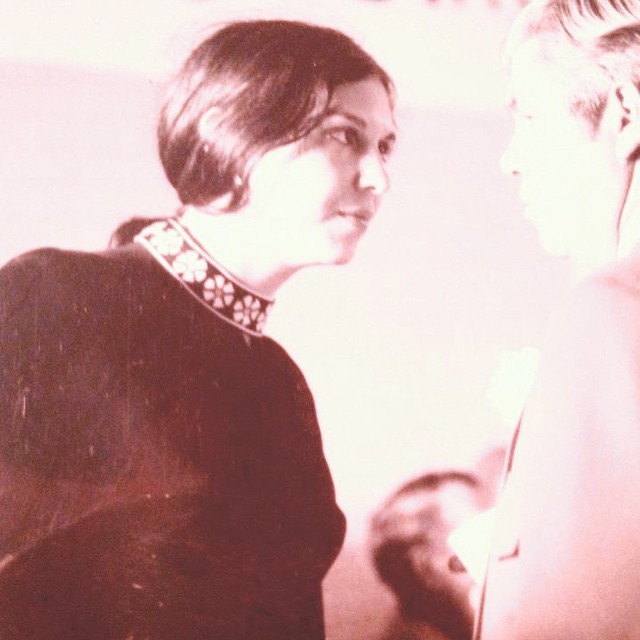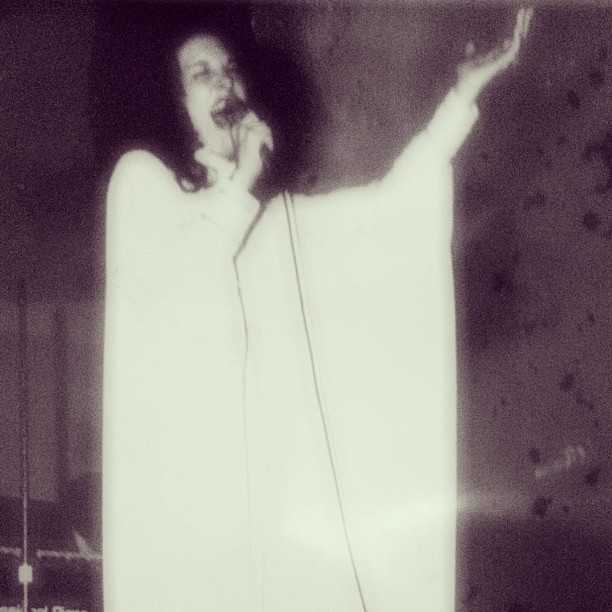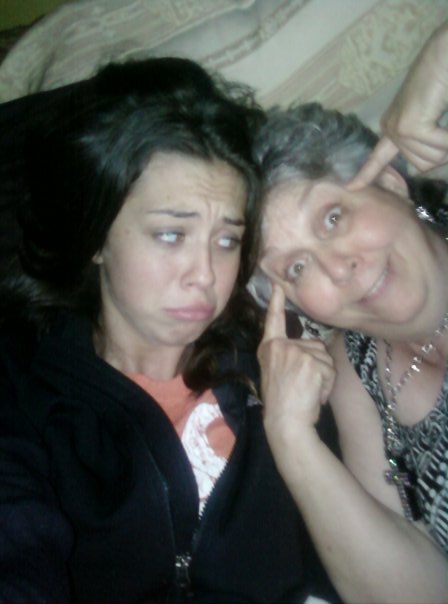Mommy: The Essence of Life Itself
Clyde, the coarse, raven-haired seraphim whose keenly filed nails seem to extend the fingers beyond their conventional margins, prolonging the end of each gesture: your coarse waves fall in unison against narrow shoulders when you incline your head backward to allow a full mouthed laugh. “Ha ha ha…..Ooooh...,” in richest tone, sounds feminine, breathy moaning along with masculine, punched clarity. Yes, even your laugh oscillates as a carol on the ear. You’re a “woman of the world,” seeking succor in your Helen Reddy and Carly Simon LP’s.
An author friend who admired her from a distance, departed from her one day, leaving devoted commendation in the opening cover his novel. Words that would linger in her ear and in my heart say, “To Claudia, the essence of life itself.” To the world, I image this is who she is. I see this only as a mythic shadow. To me, she is Mommy.
As I ponder the more romantic notions of what it means to be “Mommy”: steadfast, warm, praising, selfless, and kind, all of these brands become cliché when describing such a force of nature as her. I can’t relay her essence with anecdotes of how she came to every game and recital or baked cookies for school sales. If you ask any loving child, the spirit of “Mommy” appears in ways much more subtle. It’s in the smallest detail that any non-child would find insignificant. It’s a smell and a sound. It’s the way she made me feel.
Feel
I remember the dependable scrunch of her face as she rubbed the glossy pink night cream of Mary Kay into her face, massaging the remainder into her neck and hands with fluid vigor. Like a textbook case of classical conditioning, each passing minute of watching her nightly ritual made my eyes grow heavier and heavier. I remember how her solid pink satin gown from JC-Penny felt against my cheek, as I positioned my head in her lap for a back scratch. This was before settling down for our evening viewing of Hercules: The Legendary Journeys. Even at age five, I quickly ascertained that we were both mainly interested in the brawny physique and chiseled jawline of the main actor. I remember the contrast between the heat from the vent at the bottom of the fridge and the cold subway-tile-mimicking linoleum of the kitchen floor as I lay at her feet while she scrubbed dishes. I asked her one night what a “sexin’ handy motion” was after watching Tina Turner’s anniversary concert. What followed was an entertained chuckle before: “Well, it doesn’t exactly say that.”
I adored when she savored a song she hadn’t heard in a long time. Her dancing harkened to a period of early 70’s psychedelic free form movement mixed with a sort of Holy Roller inflection. She would step-touch from side to side, moving her hips with restrained sensuality, bringing both arms up to pause on the “1” as if in praise and then back down on to clap on the “5.” Her love of melody was the geniuses of my lifelong journey of music procurement. A ritual she had every year marked the beginning of the Christmas season. No matter what room in the house I inhabited, I would suddenly become enraptured with nostalgic elation when I hearkened the sweet and semi-platitude piano introduction of Mary Did You Know from her Kenny Roger’s Christmas album. Pleading with her to put up the Christmas tree was fair game anytime after that point. I think she enjoyed doing it as much as I did.
I loved that she was reliably extravagant in all matters, like the occasional five-page letter she left in my lunchbox. I could hear echoes of Shakespeare’s King James in her vernacular when she used phrases like, “I shall wait for the day that commeth, my child.” She could have been talking about the Rapture or the next time we’d visit Goodwill, and the inflection would be unwavering. There was no ambiguity in her intention though. She desired to leave me with a morsel of truth, begging me to plunge into depths of character and spirituality often too abysmal for an eight-year-old. Other mothers would send their children boxed chocolates or balloons to school on birthdays and Valentines Day; not Claudia. She felt those too boastful and superficial a display. She opted instead to impart with a sage’s daily wisdom either from scriptures or a Guidepost article she had just read. She always ended with “You’re my baby. I love you.”
On Sunday mornings, I would awake gruffly to the obtrusively floral, orthodox scent of Esde-Lauter’s Youth Dew being sprayed liberally on every major region of her body: lift skirt, spray. In my dazed, half wake, I would feign a coughing spell trying to exasperate her. She is unfazed, “Go get dressed. You’re riding to Sunday School with Dad.” “Yes!” as this always meant the ill-assorted breakfast combo of a donut and friend chicken-leg hurriedly grabbed from Food City and scarfed before heading into church.
My anti-social tendency caused me to skip many of the children’s church services, opting out of diluted orations of Esther, and the child with a severe case of undiagnosed attention deficit who’s mouth seemed eternally defiled by red Cool-Aid. Instead, I would cuddle up to her in the sanctuary, searching intermittently through her gallon-sized bags of assorted mints and jolly ranchers that had begun to take on one another’s flavors. Occasionally, I would run out of drawing paper, deciding to have a look through her bible. A grey case enclosed piecework of fine, tabbed pages that had obviously been analyzed, dissected, and cherished for years. There were more highlighted and notated verses than not. It was as one of those bibles that you see in exemplary memes today with the text, “This is what your bible should look like.” Between the pages were assortments of various family photographs, the precious mediocrity of my juvenile poetry, and hand-made ornaments from her grandchildren. No matter how many times I looked, I discovered something different about her when flipping through those pages.
She was fully committed to being attentive and present with me as a girl-child, delighting in my world of youthful fantasy and grandiloquently overacted exhibitions. She bought us a pink rose gold-plated tea set for Christmas when I was six. Occasionally we would sit down with our tea and pound cake. She would watch with amused smile as I ladled six to seven teaspoons of sugar into my cup whilst perfecting the cockney accent newly discovered after seeing Audrey Hepburn’s version of My Fair Lady. Intermittently she would respond with, “Yes, my dear. Well that is just grand,” in an ambiguous accent that I suppose now was a mountain woman’s attempt at Northern British. She tried, and that’s what mattered.
More poignantly, I remember the way women and men alike looked at her when they heard her sing. It was a holy conflation of sorts that formed, instantaneous. They would sit spellbound, listening to her voice with its lush resonance and chaste clarity. It was as if each modulation was running on a steel track, immovable and solid. She never emitted an airy break, or some tepid, mid-range vocal. Every note she sang seemed as if it originated in the chasm of her gut, reverberating in the chest cavity and up through her throat in full voice, until at last it was declared with perfect inflection through the mouth. Her singing was the antithesis of cerebral. It bypassed the intellect in a direct line for the soul.
Feel
There was a deep reverence in the gate of her addressees as they approached her. A kindred spirit shone in their teary eyes when they began conversing with her. People seemed to have a longing to share their innermost portion with her. Their darkness and profound sense of inadequacy came forward effortlessly when they sat with her. I now consider it is because they could see, within her, the same abundant reserve for understanding I saw. She wasn’t afraid to walk with them through those dejected retentions. People who are afraid want to gaze upon a face like hers: one that has witnessed its own existential death of sorts. They need to clasp a hand with discernable markings from the fire’s bite. This mysticism she had carried with it the power to gather disciples. She had to be careful not to abuse it. It’s automatic for any daughter to venerate the mother archetype, but her intrinsic goodness often made it difficult for me to discern her mortal and fallible self from the Devine within her.
She was there, in my dark times. I recall with vivid clarity the day my heart caved in. In the doctor’s office, I sat on the inclined bed, bare legged and shivering either because of the remaining adrenaline in my system, or the intensely low temperature of a doctor’s offices. She in sat in the chair, diagonal, observing me with an empathetic smile. She was hugging her oversized purse to her stomach for comfort, occasionally exaggerating a blink to soften the monotony of my blank stare: “It’s going to be ok. Hang in there with me.” If I hadn’t been in such a state of shock, I would have taken the time to marvel at her serene, assured demeanor while the doctor gave her the orders, “Don’t leave her alone. No driving, and keep her away from anything that she could use to hurt herself. You know the drill. “
While days passed as an unremitting blur, she would sit with me. She would be there as long as it took. Some days were spent writhing in mental anguish on the brick floor. There she was, just sitting and waiting. “Live,” was her resounding sentiment when prattle was impossible. Sometimes she would put her hands on me and pray with such fervor that her voice would hoarsen, harkening to God to let her child be free. Sometimes we would sit in silence for hours: an occasional tear rolling down the cheek of either party. One day, she performed the most poignant act. She took me by the shoulders, guiding her gaunt and impassive adult-baby to the full-length mirror in her room. She directed me to sit down. And as I sat looking at a the 18 year old figure I barely recognized in its joyless frailty, I saw her glorious juxtaposition in the frame’s backdrop saying, “I want you to look at that woman and tell her she is going to get better.” My head dropped in discouragement. She beseeched again, “Say it. Even if you don’t mean, say it.” I did.
A reciprocal intensity magnetizes our spirits. We share an immortal amalgamation of charities. We are mother and child, but I’ve come to realize that we are more. We are also two steadfast souls that have known the desolate wilderness of mental illness along with the triumph of finding your way back to the light. I think about many of our laughter through tears all-nighters, tiffs we had over a matter of semantics, and all the times she tried over and over to impart wisdom when it was doomed to meet deaf ears. All points seemed to be centered on the prospect that I would be able to enjoy my life, and I could know God is there. If I could just step back for a moment, I would have the perspective to see that all the pain and fulfillment, the happiness and lamentation were all part of the beautiful portrait.
So we revisit the turquoise adorned, raven-haired enchantress who is now a silver-mane, erudite sage. The pressure of Time’s molding digits intensify as they fashion the creases in her face and hands; but still I am a pleased bystander as women and men approach her in a store or at a restaurant to say, “You are such a striking woman.” There are few like her: those who accept the full spectrum of their gift with all its hardship and jubilation. Those who do have what Stephen King calls “the Shinning.” You don’t know what it is about them, but when they walk into a room, you know that they are cloaked in It. She is connected with the Source. When she is cloaked in it, she embodies the essence of life itself.











